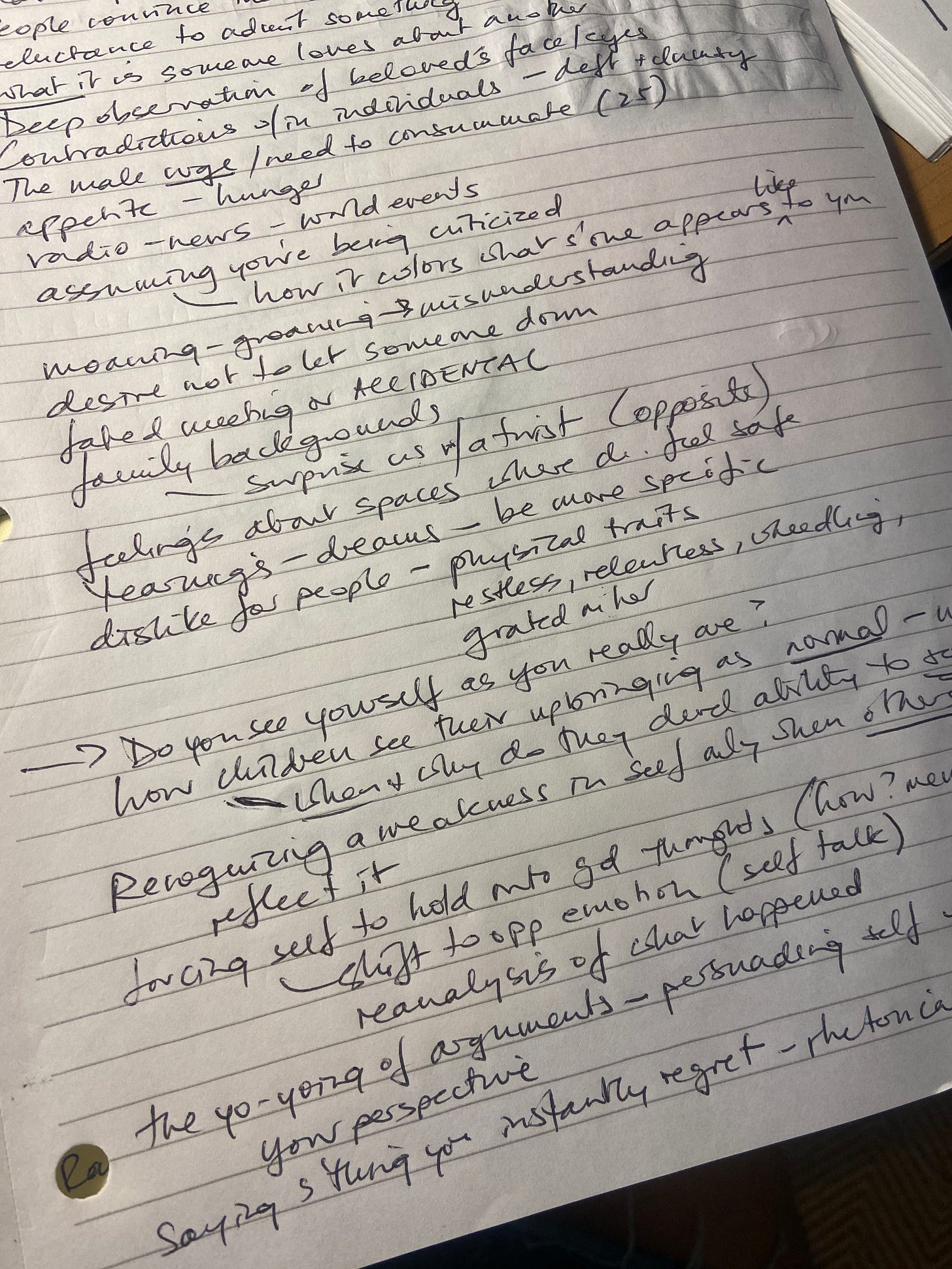This is a section of the newsletter The Curious Kat. Follow along as I write novel #4. Opting out of these updates (and sticking with the newsletter) is easy: go to the footer of this post, select "Unsubscribe" (next to “Anatomy of a Novel”) and click "Turn off emails."
If you join me here, you’ll be taking a weekly deep dive in the psychology of drafting long form fiction. Who knows, the process may surprise you. What comes easily and what is hard? What kinds of choices am I making and why?
If you enjoy the post, please click on the heart or comment in the app!Thoughts upon reading Ian McEwan’s book on Chesil Beach
Things can be magnificent and broken at the same time. The Japanese have a word for this — kintsugi, the beauty of the broken.
One of the reasons writers write is because we’re struggling to make sense of this paradox. Humans are desperate for clarity (we yearn for perfection, control): is s/he guilty or not? Is s/he good or bad? Is this right or wrong? Should I do this or that?
But of course, we seek the impossible — we live in the gray space between those polarities.
Our reality is that we will never get to a place where our lives and relationships are clear and simple (unless we leave society behind and focus only on our own needs and concerns). It’s our lot in life to be constantly trying to figure out how to survive and be happy when we will never feel — and never actually be — fully in control of our lives.
On Chesil Beach
Ready to launch back into research, I dug into my various piles to find the notebook I’d been using this summer. Flipping through it, I realized it was almost full.
And there — the very last notes I made, an entire page of scribbles that meant absolutely nothing to me. I’d written them in such a fury of excitement I hadn’t marked what they were about.
Aha, then it came to me — On Chesil Beach!
That revelation of a novel. The book that had me mesmerized for days, that took me deep into the human psyche and made me think about how complex and impossible our relationships are.
How often we make assumptions, misread signals, don’t understand ourselves, attribute motives to others that are entirely wrong, say things we don’t actually mean…
I plucked this book from the back of a tucked-away bookshelf that had been gathering dust for years, and initially I was put off. For one thing, the story was so slow. The protagonists seemed old fashioned and immature. I was annoyed that McEwan wasn’t adhering to any of the commonsense techniques authors use to “snag” readers early on.
McEwan’s books have the air of thrillers even when, as in “On Chesil Beach,” he seems to have systematically replaced mortal stakes — death and its attendant horrors — with risks of embarrassment, chagrin and regret. - New York Times review
But after about ten pages, I found myself wanting to return to it.
It’s one of those books that has a forcefield around it, and I found I could not put it down. When I was finished, I was so stunned by what I’d read and felt that I turned straight to my notebook and scribbled down my thoughts.
Frankly, given our capacity for self delusion and lack of communication skills, it’s amazing anybody can cobble together a lasting relationship.
The novel takes place during the course of a young, newly married couple’s first night together. Set in a somewhat rundown hotel on a long, stony beach in the UK in the early 1960s, it’s a largely internal story.
Lots and lots and lots of thinking going on. The action: they move around the hotel room, eat, talk, and, at the very end, emerge into the world and have an argument on the beach. (There’s one other thing they do but I feel like you should read the book to find out, haha.)
There are also a few sections that consist of very long flashbacks detailing how they met and fell in love and offering context by revealing scenes from their family lives. Those scenes are not causal - there’s no big question we’re dying to know the answer to, and yet I read them avidly, wanting to learn know more about these two people I’d so disliked initially. The interplay between these sections works well even though the tone shifts and the writing style is markedly different. The structure is both simple and complicated, and it’s masterful.
The situation is miniature and enormous, dire and pathetic, tender and irrevocable. McEwan treats it with a boundless sympathy, one that enlists the reader even as it disguises the fact that this seeming novel of manners is as fundamentally a horror novel as any McEwan’s written [.] New York Times review
Invaluable insights
What the book explores is how incredibly complex it is to be in an emotionally and physically intimate relationship with another human being. The truths that jumped out at me are so obvious they’re easy to ignore; we take them for granted.
I figured acknowledging and teasing out these truths in my scribbles would help me go deeper in my own writing. I could learn to mine human desire more honestly and thereby create more nuanced — and consequently more realistic —characters.
McEwan’s writing about motivation, desire and decision-making is incredibly granular in this novel. Here are some realities I want to keep in mind while doing my own work:
Our struggle — and inability — to describe or explain what we’re actually feeling
How we convince ourselves of the things we want to believe
That it’s almost impossible to admit when we’re wrong
People are contradictory: we can be both deft and clumsy
We are defensive, often assuming we’re being criticized or judged, and this changes how we perceive that person
Simple actions can so easily be misinterpreted!
The desire to not let someone down makes us act in ways that are in no one’s best interests
It is so hard to see ourselves as we really are
ALL children think their upbringings are normal, until something happens (and in terms of storytelling, this can be incredibly poignant)
Often we only recognize a weakness in ourselves when others reflect it back to us
The argument in the last scene is PROFOUND
My heart was pounding during the last scene between these two young people. It taught me so much about dialogue by illuminating what motivates people’s behavior when they’re in the middle of a fight. (Once you understand that, you’ll be able to write amazingly realistic dialogue.) I had so many aha! moments while reading this scene.
Arguments yo-yo in strange ways. Why?
During a fight, we spend a ton of mental energy persuading ourselves that we’re right. It’s not the fact that we’re invested in being right that’s interesting, it’s how hard we work at persuading ourselves of this even when we know it’s fallacious
We are all such prideful beings
When defensive, we spit out things we instantly regret and then we lean in (and the argument becomes a rhetorical parry)
The desire to lash out and be cruel is often not coming from our hearts — we’re playacting because being tactical is instinctive
When you’re calculating in an argument and realize it, this causes shame
Deep reading
This book reminds me that when writers know their characters deeply, they create magic on the page. The dialogue sings. An ordinary scene achieves profundity, moving readers to tears.
The very best books teach us something about ourselves and the world and leave us reeling. That’s a high bar to reach for, but I think it’s worth trying.








Love that book, thanks for articulating why!!!:) Love pretty much everything Ian McEwan writes.